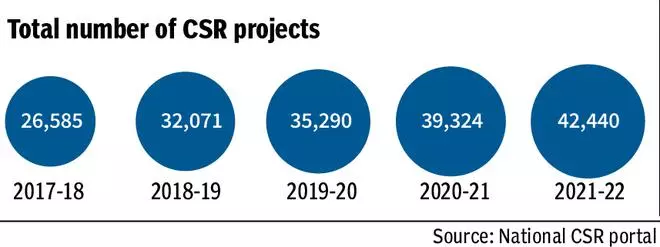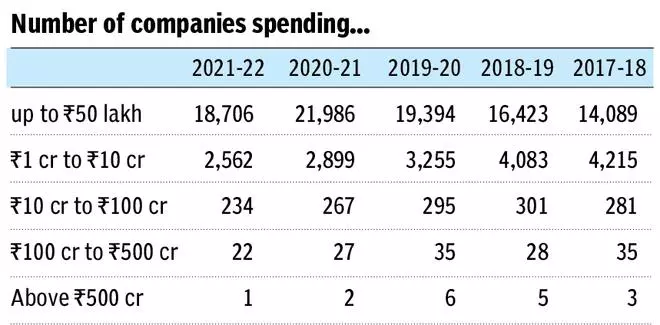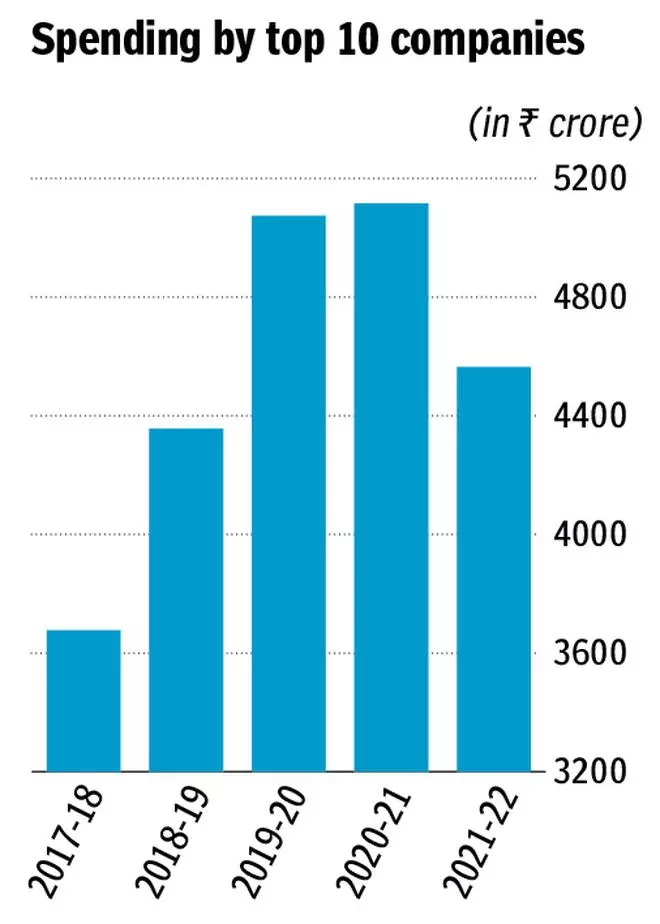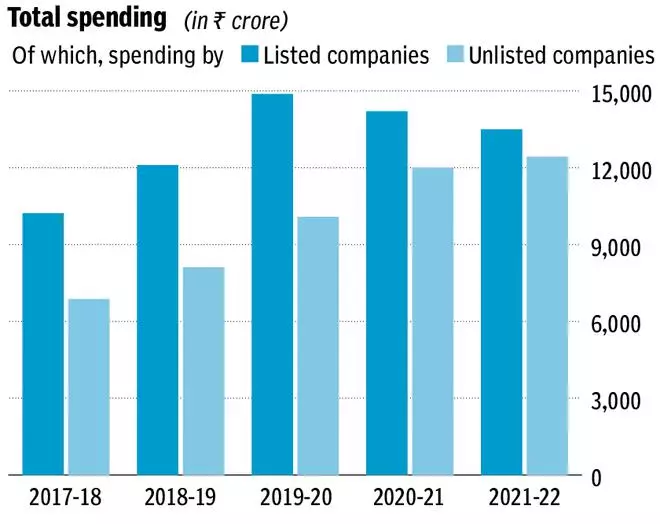But number of companies spending on CSR declined in the Covid years
Many companies were hit hard during the Covid years, registering a decline in profit and many recording losses. This resulted in reducing the number of companies which spent on CSR (corporate social responsibility) initiatives between 2019-20 to 2021-22. However, the amount spend on these activities was over 20 per cent higher in this period. Large companies such as RIL, HDFC Bank and TCS which remained resilient during the pandemic years have helped boost the spends.

A businessline analysis of the data from the National CSR Data Portal shows that the number of companies spending on CSR initiatives reached a maximum of 25,181 in 2018-19. In the post-Covid years of 2020-21 and 2021-22, the number came down to 20,840 and 18,623, respectively.
Section 135 of the Companies Act, 2013, mandates every company having net worth of ₹500 crore or more, or turnover of ₹1,000 crore or more, or net profit of ₹5 crore or more during the immediately preceding financial year, to spend at least 2 per cent of the average net profits over immediately preceding three financial years towards CSR as per the CSR policy of the company.

Maya Vengurlekar, Chief Operating Officer, CRISIL Foundation, said the decline in the number of companies (between FY18 and FY22) could largely be attributed to reduced profitability and economic uncertainty owing to the pandemic. But the pandemic years also saw greater display of corporate altruism.
Total expenditure
But, if we look at the total CSR expenditure, it has increased from ₹20,217 crore in 2018-19 to ₹25,932 crore in 2021-22. Larger companies which were profitable during Covid seem to have upped their social spends during Covid. The percentage of the companies spending more on CSR than the prescribed limit has gone up to 56.08 per cent in 2021-22 from 22.97 per cent in 2017-18.

While almost one-fifth of the companies have not reported their spending on the National CSR Data Portal, zero-spending companies have recorded a sharp fall. Around 54 per cent of the companies recorded zero CSR spending for 2017-18 and 2018-19. This number stood at 28.25 per cent and 21.10 per cent during 2020-21 and 2021-22, respectively.
Chandrakant Rao, a Mangaluru-based Chartered Accountant, said the top leaders in the corporate sector are well aware that long-term sustainability and growth are driven not merely by profit but also by ESG (environmental, social and governance) best practices.
Spending over ₹500 crore
In all these years, only six companies have spent more than ₹500 crore on their CSR initiatives. They include Reliance Industries Ltd (RIL), Tata Consultancy Services Ltd, Oil And Natural Gas Corporation Ltd, Tata Sons Pvt Ltd, HDFC Bank Ltd and Indian Oil Corporation Ltd.

Addressing the shareholders at the annual general meeting of RIL recently, Mukesh Ambani, Chairman of RIL, said his company made the highest CSR spending of ₹1,271 crore during 2022-23. With more than ₹500 crore of spending, RIL has remained as the top contributor to the CSR spending in India all these years. In 2017-18, RIL was the lone contributor in the above ₹500-crore CSR spending in the country.
Ten major corporates in the country contributed nearly one-fifth to the total CSR spending of the India Inc during the period between 2017-18 and 2021-22. In fact, RIL’s share in the total CSR spending by the India Inc was above 3 per cent during the above-mentioned period.
Spending up to ₹50 lakh
The percentage companies spending up to ₹50 lakh on CSR initiatives, which was above 84 per cent in the pre-Covid years, reached below 79 per cent in the post-Covid era.

The number of companies spending between ₹1 crore and ₹10 crore on their CSR initiatives has been going up gradually over the years. In 2020-21, a maximum 22.63 per cent of the companies spent on CSR in the above-mentioned range.
Low spending pattern
On the low spending pattern on CSR among companies, Purnima Venkat, Co-Chair of TA Pai Centre for Sustainability and Competitiveness in the Manipal-based TA Pai Management Institute (TAPMI), said some companies are looking at CSR as the mandatory requirement not understanding the benefit that comes out of it.
Stating that CSR cannot be a one-time donation, she said it has to be a programme-based initiative. Some companies try to meet just the statutory requirements as they feel it too much of a hard work when it becomes a programme-based initiative.
She suggested that the Ministries or the government agencies concerned or the industry bodies set up a mechanism to provide basic information, and conduct awareness programmes on the impact of CSR initiatives on society.
PSUs and Non-PSUs
Of the total CSR spending during 2017-18 to 2021-22, the share of listed companies stood above 52 per cent. However, the share of unlisted companies in the total CSR spending increased to 47.94 per cent in 2021-22 from 40.14 per cent in 2018-19.
Maya Vengurlekar said the listed companies increased their CSR spending during Covid years, and bulk of this was pandemic-related. That reduced the monies they poured into other areas such as health and environment.
Number of companies spending on CSR from public sector undertakings (PSUs), which was at 541 in 2017-18, stood at 313 in 2021-22. Number of non-PSUs spending on CSR came down from 20,984 in 2017-18 to 18,310 in 2021-22.
However, the spending on CSR initiatives by non-PSUs has gone up from 78.65 per cent in 2017-18 to 83.37 per cent in 2021-22. Meanwhile, spending by PSUs decreased from 21.35 per cent to 16.63 per cent in the above-mentioned period.
Article Credits: Business Line
